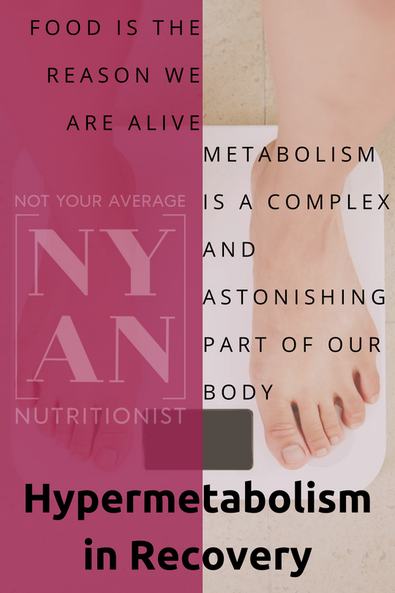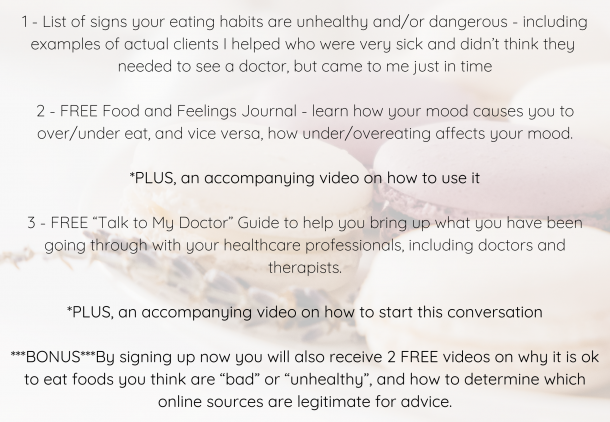By Alyssa Los
Alyssa is in the process of becoming a Registered Dietitian through the California Polytechnic State University of San Luis Obispo. Alyssa has worked with the fabulous Not Your Average Nutritionist for two weeks learning about how to implement motivational interviewing and sensitivity when discussing body image into her future practice. In her free time, Alyssa enjoys yoga, hiking the beautiful Central Coast mountains and trying out unique, new foods.
Recovery from eating disorders is a process.
When one restores their weight a state known as hypermetabolism is likely to occur. So what does this complex word mean? To break it down, hypermetabolism is the increased rate of how the body processes food into energy. When our bodies are put into a starvation state such as Anorexia Nervosa, it is common that our metabolic rate or the speed of which we process energy is slowed down. Therefore, when food is reintroduced at a higher rate our bodies have to learn how to process food as well as it needs even more calories to replenish our body’s hair, nails, bones and other essential cells our amazing bodies form!
Due to hypermetabolism, increased energy needs are required to meet our body’s demands. If you are in the process of recovering, a trusted health care professional will guide you to restoring you back to your individualized body weight. For those in recovery, approximately 50-60 kcals/kg of body weight is needed, but a Registered Dietitian is still essential at this stage as ranges can differ (1).
If you are in the process of weight restoration you may have experienced waking up at night soaked in sweat. Night sweats are a common occurrence caused by hypermetabolism seen in recovering anorexic clients. The reasoning behind this incidence is due to human bodies relearning how to utilize their new energy intake. Often our bodies end up turning the energy we are feeding ourselves into heat in the process. A study by Marzola and colleagues shows that anorexic patients had approximately a 15% higher energy expenditure with elevated body temperatures at night time compared to non-anorexic counterparts (1). Other common symptoms of hypermetabolism include gastrointestinal problems, headaches, low blood sugar and anxiety (2). Please see a professional for help as introducing foods should occur at a low pace to prevent refeeding syndrome, a disorder characterized by low Phosphorus, Potassium and Magnesium levels leading to heart irregularities, respiratory failure and seizures (3).
Remember, food is the reason we are alive. Without it our hair falls out, our nails don’t grow, our bones become brittle and many other negative consequences can occur. Reduction of fat stores in the body also results in a common condition in anorexic patients called amenorrhea, loss of your menstrual period for over 3 months (4). Therefore, when our bodies are restricted from food intake our internal biological system only focuses on the most essential parts of keeping us alive.
The metabolism is a complex and astonishing part of our bodies. It makes up every cell and practically has a mind of its own adjusting to fluctuations in intake. So the next time you wake up sweating know your body is working hard to get back on track and replenish itself back to its regular state!

Remember, food is the reason we are alive. Without it our hair falls out, our nails don’t grow, our bones become brittle and many other negative consequences can occur. Reduction of fat stores in the body also results in a common condition in anorexic patients called amenorrhea, loss of your menstrual period for over 3 months (4). Therefore, when our bodies are restricted from food intake our internal biological system only focuses on the most essential parts of keeping us alive.
The metabolism is a complex and astonishing part of our bodies. It makes up every cell and practically has a mind of its own adjusting to fluctuations in intake. So the next time you wake up sweating know your body is working hard to get back on track and replenish itself back to its regular state!


